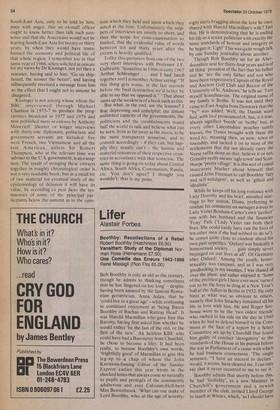What lessons?
Enoch Powell
Many Reasons Why Michael Charlton and Anthony Moncrieff (Scolar £10.000.50 It will be a long time yet before we get Proper histories of the Vietnam War, the first war lost by the United States since we burnt Washington and forced them to make peace in 1814. Its consequences, one would guess, will be about as far-reaching as those of Britain's lost war against the American colonies and France in 1776-83. But the Vietnam War contains endless instruction, not only for the Americans — that is their business butfor all peoples and statesmen. There can hardly be a war in history Where military disaster is traceable to delusions so gross and transparent on the part of the defeated side. The United States indeed Passed through three distinct and successive Phases of hallucinatory policy-forming. in 1945 the Americans gave rein in IndoChina to their anti-colonial assumptions, which obliged them to view through the world gh distorting glasses with a superimP°sed image of George III in caricature. They actually installed and blessed the Ho Chi Minh Communist regime in Hanoi and treated as enemies the French who sought, as joint victors, to return to the status quo. This phase was speedily succeeded by that of the Cold War, in which, repenting in Europe of the spirit of Yalta and undeceived elsewhere as to what Wilsonian self-determination meant when the result was a Communist or soi-disata Communist state, they endeavoured to shore up the crumbling French edifice in Indo-China. These two phases were mere preludes to the third, in which the Americans involved not themselves alone but most of their allies in a gigantic web of self-deception. The physical retribution fell almost exclusively upon the Americans themselves; but the guilt of their folly was shared by those who encouraged and supported them in it if only by token. This phase of the grand insanity, which comprised the Vietnam War proper, extended over a full fifteen years from the tentative efforts in the late Fifties with supplies and 'advisers', through the massive commitment of American might, to the ignominious collapse and withdrawal in 1973. In this phase the behaviour of the United States was actuated by the belief that South Vietnam's resistance was holding the key position, loss of which would involve the release of a torrent of 'Com munist' power that would engulf SouthEast Asia, lap the shores of India and Australasia, and threaten (Heaven knows how) the security of the American homeland itself. It was the heyday of the 'domino' theory, which 'held this truth self-evident' that `if Vietnam goes, Cambodia goes; if Cambodia goes, Thailand goes; if Thailand . . 'and so ad tedious infinitum. This erroneous perception was accompanied by unlimited faith in the victory-winning capability of American resources and by incomprehension of the power of a people on the other side of the globe to resent and repel the most terrifying exertion of military might.
I can vouch from vivid personal recollection for the arrogant predominance of those delusions here in Britain, let alone in the United States, having been, in the three peak years 1965-8, the Conservative Party's defence spokesman and found myself virtually isolated in not sharing them. I remember how anyone who at that time publicly questioned, not to say rediculed, the 'domino' theorem was treated anywhere outside the Labour Left as an arrant ass if not a self-confessed traitor. I have put on record elsewhere my altercation with Edward Heath in 1966 when I assured him that the Americans would lose the Vietnam War and be expelled from South-East Asia, only to be told by him, puce with anger, that an ex-staff officer ought to know better than talk such nonsense and that the Americans would not be leaving South-East Asia for twenty or thirty years, by when they would have transformed the economy and political life of that whole region. I remember too in that same year of 1966, when solicited in private for my views by Dr Kissinger, not yet then a minister, having said to him: 'Go on shipboard, the sooner the better', and having subsequently received a message from him to the effect that I ought not to assume he disagreed.
Kissinger is not among whose whom the BBC interviewed through Michael Charlton in 1975-7 to produce the programmes broadcast in 1977 and 1978 and now published more in extenso by Anthony Moncrieff. Shorter or longer interviews with thirty-one diplomats, politicians and government servants are included: five were French, two Vietnamese and all the rest American, unless Sir Robert Thompson, who at the relevant time was adviser to the U.S. government, is an exception. The result of stringing these extracts together in roughly chronological order is not a very readable book; but as a small bit of raw material for eventual 'study of the epidemiology of delusion it will have its value, by recording ex post facto the testimonies of some of the principal participants below the summit as to the opin ions which they held and upon which they acted at the time. Unfortunately the snippets of interviews are mostly so short, and thus the scope for cross-examination so limited, that the evidential value of words between ten and thirty years after the events is heavily qualified.
I offer this quotation from one of the two very short interviews with Professor J.F. Galbraith: 'Sometime in 1966 or early 1967 Arthur Schlesinger .. . and I had lunch together and I remember Arthur saying: "If this thing gets worse, in the last seconds before the final destruction we'd better be able to say that we opposed it." 'That about sums up the weakness of a book such as this.
But what, in the end, are the lessons? I fear depressing and unhelpful: the almost unlimited capacity of the governments, the politicians and the establishments round half the world to talk and believe what can be seen, from as far away as the moon, to be the most transparent nonsense, and to commit accordingly — if they can, but happily they usually can't — the human and material resources of their respective countries in accordance with that nonsense. The same thing is going on today about Central Africa, South Africa, Communism, Russia, etc. You don't agree? I thought you wouldn't: that is my point.







































 Previous page
Previous page